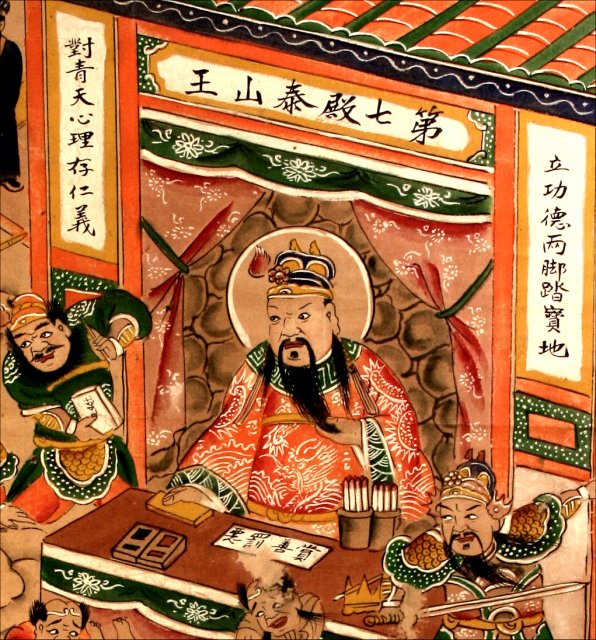
Translations
Magistrate title: Seventh court - The King of Tai Mountain
Couplets to either side of magistrate:
Standing on merit and virtue, both your feet are planted on the treasured ground.
Facing the blue heavens, the pattern of your mind preserves benevolence and rightness.
On desk: Reward goodness and punish evil
While not yet Buddhist in content, Easterm Han inscribed grave deeds from the first and second centuries provide evidence of an increasingly bureaucratized vision of the afterlife, and they could be addressed to dozens of afterlife officials such as "the (grave) tumulus assistant," "the prison clerk overseeing the grave, and "the underground two-thousand-picul officials." They also provide early evidence of an association between the dead and Tai Mountain, juxtaposing the empire's capital with Tai Mountain when it comes to the proper jurisdictions of the living and the dead respectively. For example:
The living belong to Chang’an;
The dead belong to Tai Mountain.
The dead and living occupy separate regions,
Never hindering one another.
Furthermore, just as the Lord of the Southern Dipper oversaw the records of life whereas the Lord of the Northern Dipper was in charge of the records of death (see the second scroll), these grave deeds also evince a similar directionality:
The human path passes through;
The ghostly path is blocked.
The yang path heads southward;
The yin path heads northward.
These grave deeds tend to highlight the desire to keep these paths separate as well as the wish that the dead will not haunt or cause misfortune for the living. As a last example demonstrates:
We exorcise the monthly baleful disruptions of the grave carried out by the eight ghosts and nine phantoms.
We exorcise the ghosts who would return to the ancestral tablet, authors of tragedies great and small.
We exorcise the spirits of the north, those from heaven that seize and those from earth that snatch.
We exorcise the tumulus assistant and grave captain, those who frighten from heaven and those who frighten from earth.